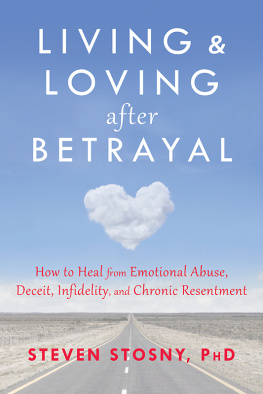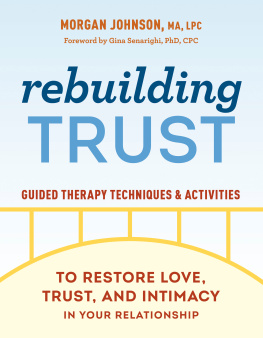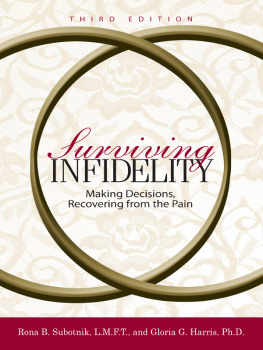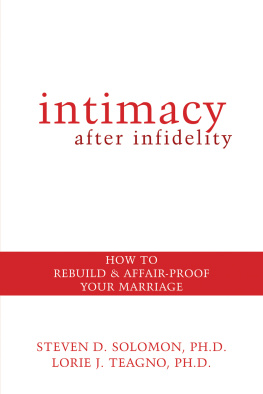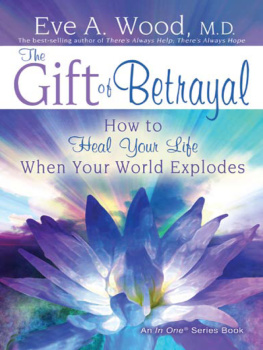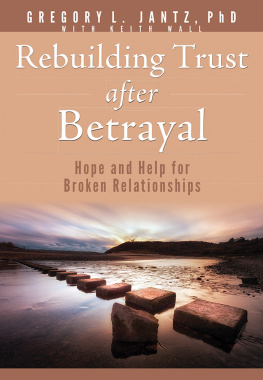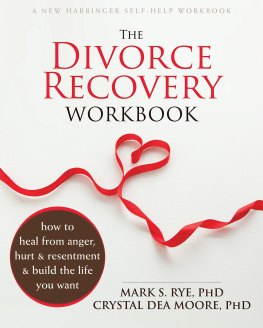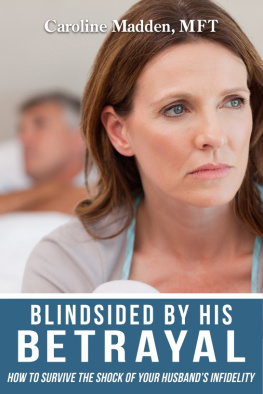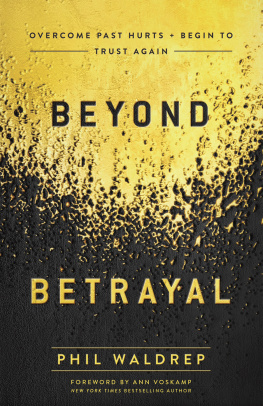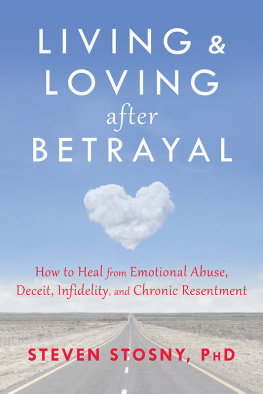Steven Stosny, PhD, is founder of CompassionPower, a successful anger-regulation program that he has directed for more than twenty years. In addition, he has treated more than six thousand people through his organization. He has appeared on many major media programs, including several appearances on The Oprah Winfrey Show. He is author of Love without Hurt and You Dont Have to Take It Anymore, and coauthor of How to Improve Your Marriage without Talking about It. He has taught at the University of Maryland and at St. Marys College of Maryland, and he currently has a blog on www.psychologytoday.com.

Living and Loving after Betrayal offers a strong rope out of the quicksand of misery and despair that couples sink into after a betrayal. Stosnys guide to healing the heartache of betrayal is the most helpful I have seen in twenty-five years of clinical practice.
Ronald J. Coughlin, EdD, licensed psychologist with twenty-five years in full-time private practice
Since a pain-free life isnt possible, we need to understand and follow the wisdom provided in Living and Loving after Betrayal. Stosny, one of todays most highly respected relationship experts, understands how to grow and have a more satisfying life after being deeply hurt by others. This is a deceptively simple tool kit for effectively handling the full range of relationship disappointments and heartaches.
Jon Carlson, PsyD, EdD, distinguished professor in the Division of Psychology & Counseling, Governors State University
This is a remarkably wise and compassionate guide to healing from intimate betrayal. It will help you recover the best of yourself rather than remain stuck in anger or anxiety. I will ask my clients to read this book and I will give it to loved ones who are on a healing journey.
William J. Doherty, PhD, professor and director of the Minnesota Couples on the Brink Project at the University of Minnesota, and author of Take Back Your Marriage.
Stosny has broken new ground for individuals moving forward from any type of betrayal or violation of the intimate bonds of relationships. He takes the reader beyond hurt, even beyond healing, into the area of personal mastery by way of compassion. This book is a must read for anyone who has felt the pain and disappointment of a once-trusted relationship.
Pat Love, EdD, coauthor of How to Improve Your Marriage without Talking about It and Never Be Lonely Again
This excellent book addresses an often-overlooked aspect of healing from betrayal, and that is self-healing. When people get hurt, their attention usually turns to the perpetrator of the hurtones partner. But part of the real work that needs to be done is on ones self.
If you have felt the devastating effects of betrayal, this must-read book will help restore your inner resilience and faith in yourself so you can get through the difficult periods and thrive beyond them. Stosnys workbook-like exercises help you apply what youre learning to your own unique situation. Youll feel like you have a personal coach guiding you to better times!
Michele Weiner-Davis, author of Divorce Busting and The Sex-Starved Marriage

Publishers Note
This publication is designed to provide accurate and authoritative information in regard to the subject matter covered. It is sold with the understanding that the publisher is not engaged in rendering psychological, financial, legal, or other professional services. If expert assistance or counseling is needed, the services of a competent professional should be sought.
Distributed in Canada by Raincoast Books
Copyright 2013 by Steven Stosny
New Harbinger Publications, Inc.
5674 Shattuck Avenue
Oakland, CA 94609
www.newharbinger.com
Cover design by Amy Shoup
Acquired by Melissa Kirk
Edited by Susan LaCroix
All Rights Reserved
Library of Congress Cataloging in Publication Data
Stosny, Steven.
Living and loving after betrayal : how to heal from emotional abuse, deceit, infidelity, and chronic resentment / Steven Stosny, PhD.
pages cm
Includes bibliographical references.
ISBN 978-1-60882-752-7 (pbk. : alk. paper) -- ISBN 978-1-60882-753-4 (pdf e-book) -- ISBN 978-1-60882-754-1 (epub) 1. Trust. 2. Betrayal. 3. Intimacy (Psychology) 4. Interpersonal conflict. 5. Interpersonal relations. 6. Couples--Psychology. I. Title.
BF575.T7S76 2013
158.2--dc23
2013011797
To my thousands of clients who have shown the awesome courage to heal and grow from the depths of relationship betrayal.
And, as always, to my mother, who overcame every form of intimate betrayal to become a compassionate, loving, and powerful person.
Introduction
If you have felt betrayed by a lover in a committed relationship, you know all too well that intimate betrayal is a pain unlike any other, striking at the core of our capacity to trust and love. This extraordinarily harsh and lingering pain almost invariably overflows into other areas of life. Work efficiency plummets for most who suffer its sting. Some feel unable to resume their normal level of caring behavior in any relationship, including those with friends, parents, and children. Many are left feeling unworthy of love. Most endure long periods of dull ache or depressed mood, punctuated by torrents of anger, shame, guilt, anxiety, resentment, and grief.
The destructive force and lasting effects of intimate betrayal come from its violation of the implicit promise that gives us the courage to love in the first place: the promise that no matter what happens, the person you love and trust will care about your well-being and never intentionally hurt you.
These two key elements classify the types of intimate betrayal. Behaviors that intentionally hurt include most emotional abuse, verbal aggression, and domestic violence. Failure to care about your well-being covers most deceit, infidelity, covert misuse of communal resources, continual resentment, anger, criticism, stonewalling, and other isolating or hurtful behaviors.
Think Healing and Growth, Not Labels
For the purposes of this book, Ill define emotional betrayal as anything that left you feeling betrayed, hurt, angry, and distrusting, with lingering aftereffects of painful memories. That said, labeling specific behaviors as betrayal or abusive or deceitful is not the purpose of this book, and not just because labels tend to oversimplify complex patterns of behavior and the contexts in which they occur. More importantly, you should not be made to feel that you must explain your experience or justify your pain to qualify for a certain label. Trying to fit your circumstance into convenient labels would keep you focused on the extent and causes of your injuries rather than healing and outgrowing them; that is to say, it would embed the footprints of betrayal in your heart and soul. Youve probably had arguments with your betrayer concerning labels of his behavioryou saw it one way and he denied, minimized, evaded, or blamed. Such arguments are as fruitless as they are frustrating. Worse, they obscure the most vital issue: your pain, which seemed to get lost in disputes over behavioral labels and characterizations.
Lets declare right from the start: You do not have to justify your hurt or fit it into any kind of category. You dont have to characterize your partners behavior with labels you get from a book. All that matters is that it hurt you, and you deserve to focus your enormous emotional resources on the difficult task of healing, recovery, and growth. This book will give you the courage and skill to do so.

